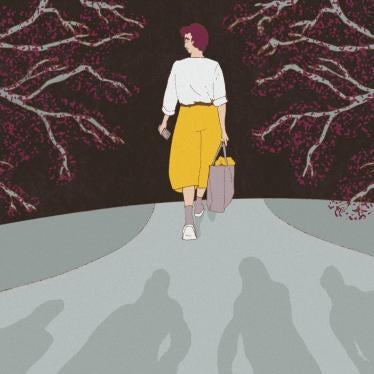Karar Nushi, an Iraqi model well known for his long blond hair and flamboyant clothing, was found dead in Baghdad on July 2, 2017. Nushi was reportedly tortured and stabbed, and his body mutilated. His attackers also cut his hair. Indeed, friends of Nushi believe he was murdered by an armed group because of his long hair.
For lesbian, gay, bisexual, and transgender (LGBT) people, who are often pushed to the social margins, hair can be an especially significant form of self-expression. Styling can signal group affiliation, or simply distance from the mainstream. But in repressive settings, hairstyles can also be a liability, visible markers of difference, and even a catalyst for violence. In some contexts in Iraq, hair can trigger egregious acts of cruelty by armed groups, and, in numerous instances, even death.
Nushi’s case is one among many others Human Rights Watch (HRW) documented in a recently published report on Iraqi armed groups’ killings, abductions, torture, and sexual violence against LGBT people. In numerous accounts, the attackers shaved their victims’ hair, or demanded that they sign documents pledging they would cut their hair.
Springing up amid the breakdown of security after the US-led 2003 invasion, armed groups in Iraq feed on poverty when recruiting members, offering unemployed men a job and the prospect of gaining power and influence through violence. Although many armed groups in Iraq have claimed to be enforcers of their interpretation of Sharia (Islamic law), a Human Rights Watch report demonstrated how a 2009 killing campaign of men suspected of same-sex conduct, led by Iraqi armed group members, violated standards in Sharia law for legality, proof, and privacy. Stretching over the last two decades, violence directed against LGBT people in Iraq can be understood in the context of patriarchal social norms, the low social status of women, and a culture of impunity.
In Iraq’s environment of persistent violence, why would armed groups pay such close attention to something as seemingly inconsequential as a hairstyle? As many people told HRW, hairstyles are an important symbol of compliance and conformity with social norms and gender roles.
Policing hair has become a part of a crude enforcement of gender norms among some powerful armed groups in Iraq. When hairstyles publicly signal difference by breaking with rigid gender roles, they symbolise a perceived threat to the social order and an affront to authority.
Last year, an 18-year-old gay man was stopped by an armed group called Hashd al-Atabat in Karbala governorate in central Iraq. He was told it was due to his “shameful appearance,” in this case: having long hair. He said, “after the armed group’s leader came, he told his men to cut my hair and then let me go.”
Of the 54 LGBT people interviewed, 48 said that unconventional hairstyles were regarded by armed groups as a punishable offense. This means that men and transgender women with long hair, or women and transgender men with short hair, were perceived as deviant and hence more likely to be targeted. The consequences of having non-normative hairstyles can range from arrest to torture, rape, and even death.
Ahmad Majed al-Mutairi, known as Hammoudi, had been targeted and shot by suspected armed groups in 2018 due to his long hair. Hammoudi was popular on social media for posting pictures highlighting his feminine appearance. He was only 14 when he was murdered. A video of his gruesome murder circulated widely on social media. The attackers can be heard taunting him with homophobic slurs as Hammoudi, bleeding from his abdomen, pleads to see his mother.
These violent attacks are not new. In 2012 HRW documented attacks directed against young people who participated in “emo” subculture, based on a form of alternative rock music, characterized by a distinctive style of dress, and unconventional haircuts. In the wake of systematic and fatal attacks, panicked “emos” scrambled to change their wardrobes and cut their hair.
Gender nonconforming hairstyles are also conflated with homosexuality, which is further construed as inherently anti-Islamic and pro-Western. One of the documented forms of punishments in the attacks on LGBT people is rape—and in particular male attackers sexually assaulting male subjects as a form of punishment for consensual same-sex activity, or gender non-conformity. Anti-sodomy laws which were reintroduced in Iraq in 1919 during the British Mandate, after the Ottoman Empire abolished them in 1858, and are still in use today.
Some police and members of armed groups mete out brutal punishments that leave permanent scarring; those carried out in public are intended as a clear message to others. That message is that difference and freedom of expression outside of stereotypical gender roles will not be tolerated.
No one should be punished for how they style their hair. In addition to protecting LGBT people from violence, the Iraqi government should undertake public campaigns to end stigma against LGBT people and work with ministries, institutions, and civil society to raise awareness about respecting diversity in gender norms, including free expression through hairstyles.









